FLORIDA — Reporters on either side of me were frantically jotting down quotes, desperately hoping that Mitt Romney would make some kind of news—anything to help fill the demands of Twitter, news blogs, news websites, broadcasts, and the next morning’s newspaper.
I too tweeted at rapid speed as Romney spoke to several hundred supporters at the Palm Beach County Convention Center in West Palm Beach. Some samples:

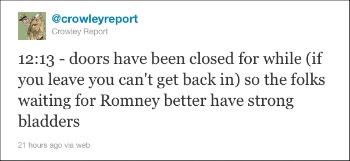
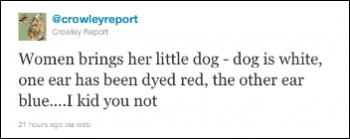
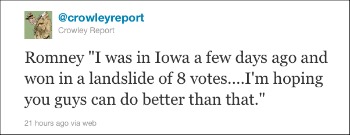
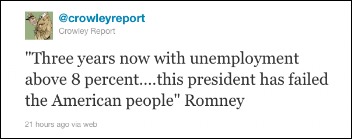
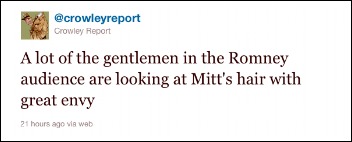

That last tweet summed up the problem—Romney said nothing new.
Romney spoke for a bit more than 15 minutes. Toss in another 15 minutes of shaking hands, and Romney spent a mere 30 minutes on public view—none of it particularly newsworthy.
But the armada of media on hand would have led viewers and readers to believe that this was not just a major Republican campaign event, but the political event of the campaign. Romney’s relatively brief visit to Florida, which also included two closed-press fundraisers on the island of Palm Beach, was greeted with print, web, and broadcast stories the day before his arrival and breathless coverage during his visit.
One local station, WPTV NewsChannel 5 (where I contribute political analysis), had five reporters on the scene and a helicopter overhead. Television stations from Tampa to Miami were there. A dozen television satellite trucks were parked outside the convention center. Newspaper reporters from throughout Florida and the nation were there—to report that Romney, well, did nothing.
Did Romney deserve this extensive coverage? As the leading presidential candidate, someone widely presumed to be the likely nominee, Romney has earned a higher level of scrutiny.
But were readers and viewers well served? Much of the coverage was superficial or even cheerleading. Consider the online headline for the story at TCPalm.com, a Scripps Newspapers site: “Romney wows crowd of 500, including some from Treasure Coast, during West Palm Beach stop.”
The story’s lede: “Republican presidential candidate Mitt Romney swooped into the city Thursday for a noon campaign stop at the Palm Beach County Convention Center and spoke as if he was the GOP nominee.”
Swooped? Really?
National coverage was less fawning but hardly more penetrating. The Washington Post noted that “many attendees expressed strong support for Romney”—an unsurprising observation considering it was a Romney rally. And in a desperate search for a news hook, Reuters grabbed as its lede Romney’s oft-repeated assertion that, as president, he would “stand with our friends” in Israel.
The best coverage embedded the rally in more far-reaching reporting. For example, the Sun Sentinel’s Anthony Mann used Romney’s appearance as simply a backdrop for his own reporting on the complicated relationship Florida Republicans have with the former Massachusetts governor.
Another important story was written by the Miami Herald’s Marc Caputo, who greeted Romney’s arrival in Florida with an advance, in-depth look at the Romney campaign machine and some of the issues it confronts—including discussion about the Bain Capital controversy that has dogged Romney since the New Hampshire primary.
That leads to a final question—would other candidates have received the same attention? Maybe. While news organizations have often seemed befuddled over the last year in trying to figure out who the leading candidates were at any given moment, today there is more clarity. Votes have been cast. Reporters know who has the needed money and other resources to campaign successfully in a large state such as Florida. So news organizations can make better judgments.
But if Florida news organizations have made the decision that Romney deserves extraordinary coverage, then they need to make sure that coverage includes an equally in-depth look at Romney’s views about issues important to Floridians—housing and foreclosures, Florida’s deep unemployment, severe cuts to the space program, relationships with Cuba and Haiti, and oil drilling off Florida’s coast are just a few examples.
Assignment editors and reporters should remember that it is not up to the candidate to make the news. You can find it yourself.
Brian E. Crowley is editor of Crowley Political Report. A political journalist for more than two decades, Crowley is an analyst for WPTV NewsChannel 5 in West Palm Beach and is a principal of ImMEDIAcy Public Relations.
